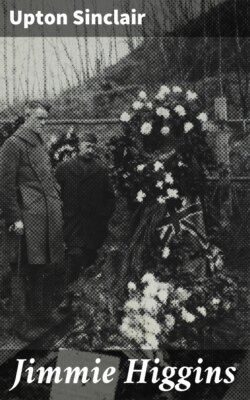Читать книгу Jimmie Higgins - Upton Sinclair - Страница 7
На сайте Литреса книга снята с продажи.
III.
ОглавлениеTable of Contents
When you went from the Leesville Opera-house and turned West in Main Street, you passed Heinz's Cafe, which was a “swell” eating-place, and not for Jimmie; and then the “Bijou Nickelodeon”, with a mechanical piano in the entrance; and the “Bon Marche Shoe Store”, which was always having a fire-sale or a removal sale or a bankruptcy clearing-out; and then Lipsky's “Picture Palace”, with a brown and yellow cowboy galloping away with a red and yellow maiden in his arms; then Harrod's “Fancy Grocery” on the corner. And in each of these places there was a show-card in the window, with a picture of the Candidate, and the announcement that on Sunday evening, at eight o'clock, he would speak at the Leesville Opera-house on “War, the Reason and the Remedy”. Jimmie Higgins looked at the cards, and a dignified yet joyful pride stirred in his bosom; for all of them were there because he, Jimmie, had interviewed the proprietors and obtained their more or less reluctant consent.
Jimmie knew that on this Sunday, in cities all over Germany, Austria, Belgium, France and England, the workers were gathering by millions and tens of millions, to protest against the red horror of war being let loose over their heads. And in America too—a call would go from the new world to the old, that the workers should rise and carry out their pledge to prevent this crime against mankind. He, Jimmie Higgins, had no voice that anybody would heed; but he had helped to bring the people of his city to hear a man who had a voice, and who would show the meaning of this world-crisis to the working-people.
It was the party's Candidate for President. At this time only congressional elections were pending, but this man had been Candidate for President so often that every one thought of him in that role. You might say that each of his campaigns lasted four years; he travelled from one end of the land to the other, and counted by the millions those who heard his burning, bitter message. It had chanced that the day which the War-lords and Money-lords of Europe had chosen to drive their slaves to slaughter was the day on which the Candidate had been scheduled to speak in the Leesville Opera-house. No wonder the Socialists of the little inland city were stirred!
Jimmie Higgins turned into “Tom's Buffeteria”, and greeted the proprietor, and seated himself on a stool in front of the counter, and called for coffee, and helped himself to “sinkers”—which might have been called “life-preservers”, they were blown so full of air. He filled his mouth, at the same time looking up to make sure that Tom had not removed the card announcing the meeting; for Tom was a Catholic, and one of the reasons that Jimmie went to his place was to involve him and his patrons in arguments over exploitation, unearned increment and surplus value.
But before a discussion could be started, it chanced that Jimmie glanced about. In the back part of the room were four little tables, covered with oil-cloth, where “short orders” were served; and at one of those tables a man was seated. Jimmie took a glance at him, and started so that he almost spilled his coffee. Impossible; and yet—surely—who could mistake that face? The face of a medieval churchman, lean, ascetic, but with a modern touch of kindliness, and a bald dome on top like a moon rising over the prairie. Jimmie started, then stared at the picture of the Candidate which crowned the shelf of pies. He turned to the man again; and the man glanced up, and his eyes met Jimmie's, with their expression of amazement and awe. The whole story was there, not to be misread—especially by a Candidate who travels about the country making speeches, and being recognized every hour or so from his pictures which have preceded him. A smile came to his face, and Jimmie set down the coffee-cup from one trembling hand and the “sinker” from the other, and rose from his stool.
